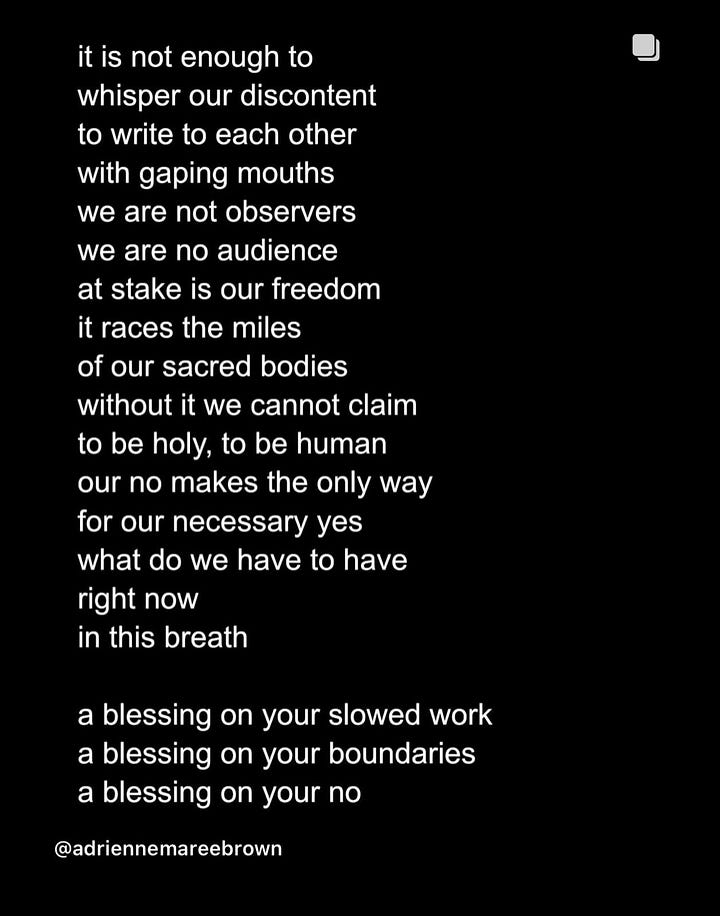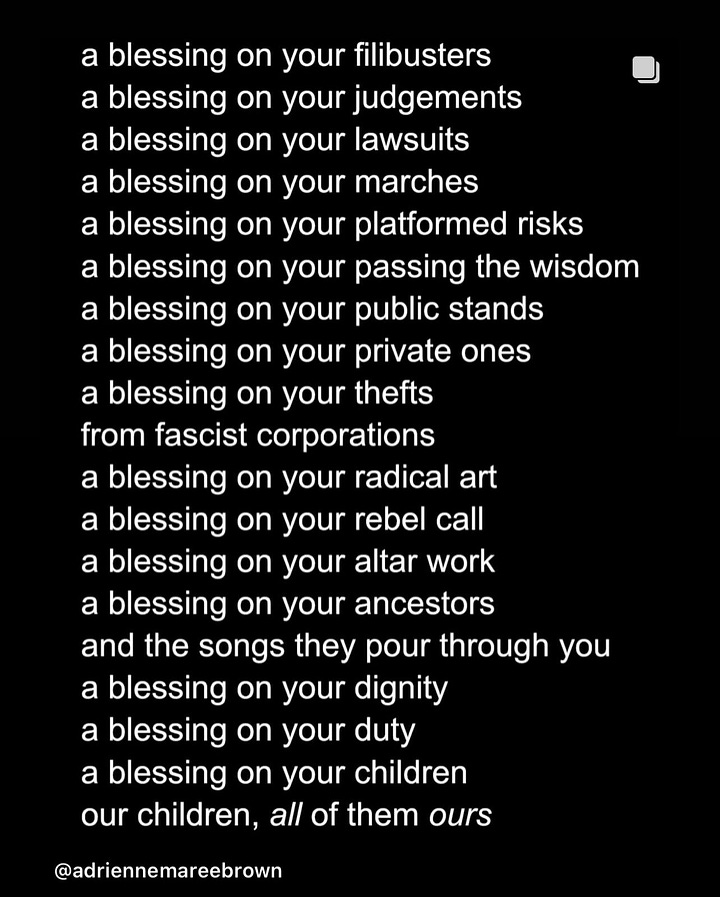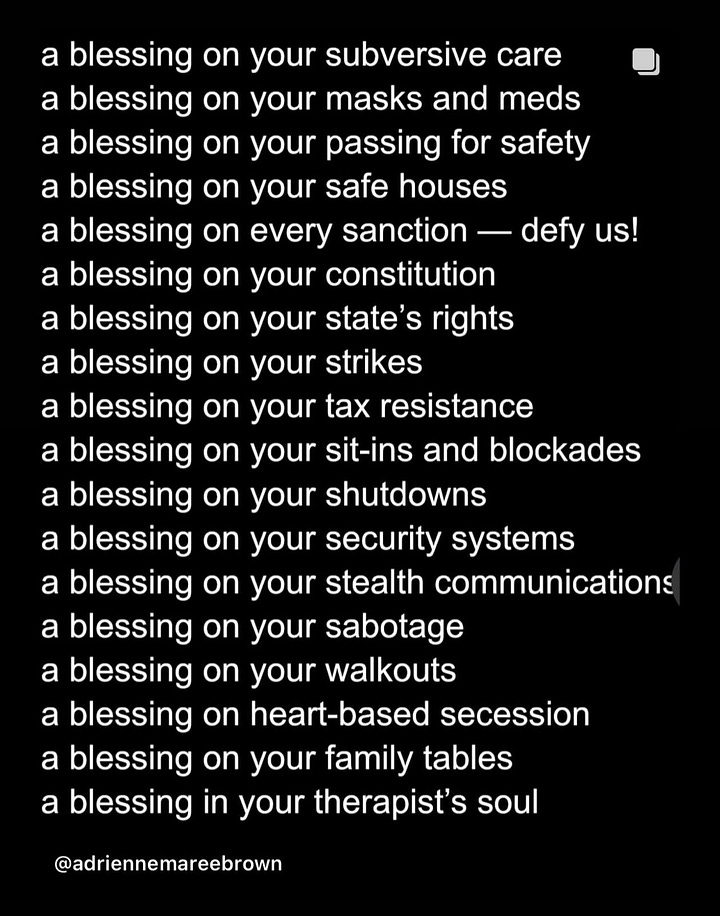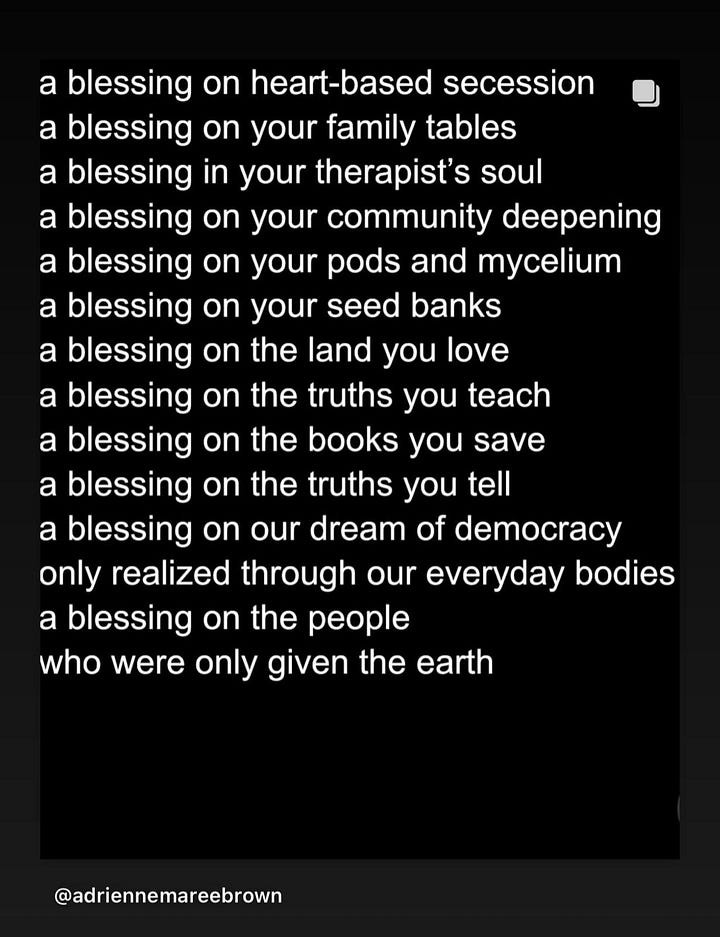How We Can Hide In Inner Work and the Call Of Emmanuel Levinas
to my white colleagues in spirituality and psychedelics
First: If you are reading this and you are struggling with news overwhelm, with figuring out what you can do, with balancing your activism with self care…. please stop reading. This piece is not written for you.
Spend the time you would spend on this piece (and hopefully more) with a cup of your favourite tea, in your favourite blanket or some other nervous system support.
If you would like some support join my signal group where you can come and receive some encouragement and resources to support your nervous system.
*********
On Fridays I write about the shadow side of personal growth culture. Today’s topic is our tendency to be insular and seek the highs of connection while ignoring systemic injustice and suffering in the world at large.
Let’s start with the phrase “I don’t have capacity.”
This is language that is often used in so-called conscious circles and it seems to have various meanings. “I don’t have capacity” can mean:
I am hitting a nervous system limit so am setting a boundary.
I don’t have time.
I need to take care of ___ first.
“no” but I want to soften the blow.
I have never had to develop the particular character quality requested (for example courage, resilience, steadfastness) so this request feels like too much (no one is going to say that but I’m sure you’ve seen this)
We have the blatant ignoring of rule of law in the United States of America. A Coup. We have the most important election of our time in Canada. And so much more. The world is in pain and it needs us.
There are a few possible responses to this:
(1) I don’t agree with this perspective, Alison. I support the US administration and the direction of politics and the world generally.
(2) I agree but I don’t have capacity.
(3) I agree. I want to act/am acting. It’s hard and requires massive levels of nervous system regulation and community support given and received.
Let’s take a detour and talk about what I mean by acting. I love this poem by Adrienne Maree Brown:




Taking action does not look one way. It’s your way. Your medicine for the world.
OK back to the main thread.
The shadow side of personal growth culture I am talking about is number (2) above. “I agree that the world needs us but I don’t have capacity.” It’s a kind of no man’s land where we say we believe in caring for others but we pass by the suffering stranger on the road. We’re not present here. We’re split.
Oh have I been here. I have a whole “I don’t have capacity” story. “I need to take care of my mental health, my physical health, my finances. I don’t have time or space to take on something else that doesn’t contribute to these.” These statements never feel powerful, though. They’re excuses and at some level I know it.
The thing is - there will never be a good time. Never enough “things that I have” to make me feel like I can then “start to give.”
This moment in time is now. What is the point of decades of inner work, retreats, workshops, taking care of ourselves if, when our world needs us, we say no?
The question, I believe, comes down to each of us, in our heart of hearts, saying either ‘no’ or ‘yes’ to collective liberation. We don’t have to say ‘yes’ gleefully. Christ begged to have his life purpose removed from him. These times aren’t fun. It’s not all pleasure. And we as part of the dominant culture have the choice whether or not to engage - that is a massive privilege.
So if number 2 is where we land I am asking us to go deeper and decide if we are a no or a yes. To move ourselves into number 1 or number 3.
Take your time. Feel into this. Breathe with it. It’s a private question. Are you a ‘yes’ or a ‘no’ to collective liberation? To all of us in this together? That’s all you need to know. ‘Yes’ or ‘no.’
[Here’s a footnote about number 1 in case you support the current move towards fascism across the globe and are also on board with collective liberation.1 ]
The rest of this piece is directed at those who choose ‘yes’.
Choosing yes does not mean you lose yourself, your agency, your boundaries or your time. Choosing yes means this:
‘Yes’ you are part of us. Perhaps you “feel that you do not have capacity to make a difference.” But your heart is a yes. This is what matters. Stay here for a bit. You are love and you are connected to your love.
As you stay here… feel your feelings. Get support. Talk with others. Take a long nourishing walk. Journal it out. And in time, as you are ready, find one thing you can do…. cooking a meal for someone, sharing a post you believe in….
What it looks like no one can say but you. You know what it feels like from the inside to gently, over time, open your heart and embody your gifts.
The yes is in our hearts. It is a stance. It is not split into “I think this but…”. It is a whole energy all on its own: ‘yes’.
We’re going deeper now. Deeper into what it mean to say yes. It’s going to be challenging. Stay with me.
The action we take is never enough. It can’t be.
Emmanuel Levinas was a Lithuanian Jew, philosopher, and Talmudic scholar. His entire Lithuanian family was murdered by the Nazis and he himself spent five years in a work camp. His experience of the Holocaust shaped his work. He built on the existential phenomenological tradition to argue that our fundamental existential stance is not aloneness but responsibility to the other. There is no check box for completion here. We are always already responsibile.
I know this is going to raise a lot of alarm bells. That’s normal - welcome to the fun! [I spent three years in a weekly study group trying to wrap my head around Levinas and still...]
Yes - you as a person are enough. But we can never finish the task of meeting the suffering and injustice in our world. There’s always more. Levinas’ call is a call of maturation into the recognition of the truth of this. It’s a challenging call and I believe it is a generative one that deserves its due today. Not to beat ourselves up but to stay responsible. To stay open. To deeply understand that we are only us because we are not the other and thus our responsibility to the other is infinite.
Yes I am opening up a philosophical rabbit hole here but I am bringing in Levinas to ground my argument in a body of work born out of trauma and as a response to fascism. I am sure you can imagine how he, writing after the end of World War II having lost is entire of origin could believe that we as humans could have done better. We can do Levinas the honour of learning from him now.
This does not mean we people please (fawn) - which is a trauma response. People pleasing is not actually a giving response it is a giving response in order to take because it is acting from trauma. Fawning is not a chosen response. We have to take care of ourselves, including our bodies and our traumatic responses as part of our responsibility to the whole.
Infinite responsibility also does not mean that we override our nervous systems. It is much more subtle than that. It is the energy of “yes” I take responsibility for my part in collective liberation.
We must, however, remember that we are not entitled to feel safe. We have nervous systems for a reason. Our bodies are designed to act appropriately under threat and then to regulate after. This is how we grow and we are here to create new things and to grow - that is what humans do.
Nervous system regulation is an important skill but being continually calm is not the ultimate end state for a human being.
The fact we lost the ability to self regulate and are regaining it through our practices does not mean that we should be avoiding dysregulation when there is such a serious threat to life as we know it.
It is up to us to know if, in our times of fear, we are hiding from suffering or if we are nourishing ourselves to go out again and do the work - this is our moral quandary that we must not hide behind the language of trauma. Again - this is for each of us to consider - I am affirming the work of trauma healing and I am also asking us to see what is beyond that.
Consider this - we are always all the time hiding - it is not possible in this global world we have created not to. We know suffering is everywhere. We live in a luxurious world of health care, travel, technology, communication…We now have to learn to live in that world as moral beings - humans that have minds and hearts. The cost of our advancement is the weight of moral responsibility. A terrible, ongoing quandary that must be balanced with rest, ease, joy and pleasure.
Are we keeping ourselves in a bubble of feeling safe?
Are we underestimating our ability to regulate after we dysregulate?
We are the ones who have access to therapy, who have daycare and nannies, who have vacations and homes with private spaces, two able bodied adults living in a home…. we have capacity.
If us white, home-owning, educated, psychedelic devotees do not step up to fight for human rights what is the point of holding hands and saying love is all there is?
When we say community who do we mean?
Who are we holding space for?
The world isn’t waiting for us to feel like we’re ready. The baby is here to be tended.
And how we parent our times determines the quality of the times that come after us.
The ethical call to the other is unwanted, conscious and chosen.2
This is the paradox we each have to work out day by day: We take action in our own time and time is of the essence.
If you are overwhelmed by collective chaos and/or don’t know where to start in taking action, join this signal group moderated by me for emotional and resource support. There are some easy ways to get started. No financial cost.
I believe it is entirely possible to support what is currently happening in politics and also believe that we are walking each other home. In this case, however, I suspect that you are not living in a constant state of fear. Things are going your way and you can relax. You’re not questioning your capacity to contribute as you’re not in a fight for your life so the question doesn’t really apply to you.
Donna Orange in a talk on December 12, 2012 in Toronto.






[I]t is not our part to master *all* the tides of the world, but to do what is in us for the succour of those years wherein we are set, uprooting the evil in the fields that we know, so that those who live after may have clean earth to till. What weather they shall have is not ours to rule.
I wonder if Tolkien knew Levinas…